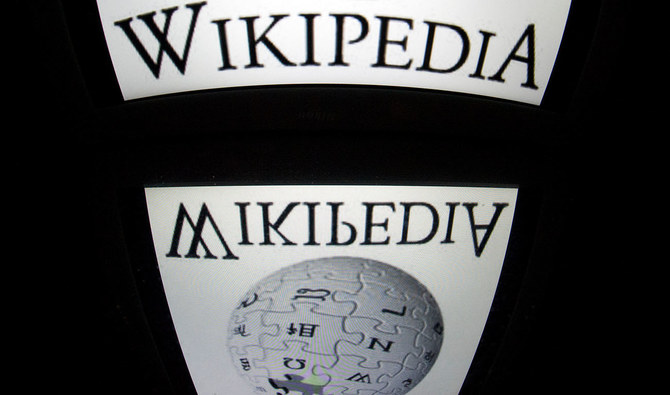ISLAMABAD: Pakistan’s telecommunication regulator on Wednesday announced it had degraded online encyclopedia Wikipedia’s services for 48 hours across the country, accusing it of failing to block or remove “blasphemous content” from its platform.
Pakistan, the second-largest Muslim-majority country in the world, has banned video streaming platforms and dating apps in the past on charges of spreading “immorality” or promoting blasphemous content. Degradation of services means disruption in the service speed and the response time of a website or any network.
In September 2020, Pakistan blocked Tinder, Grindr and three other dating apps for not adhering to local laws, with the Pakistan Telecommunication Authority (PTA) saying it had taken the decision to curb the “negative effects of immoral/indecent content streaming.”
In November 2021, a Pakistan court reversed a ban on short-form video hosting service TikTok after the government assured it would monitor “immoral” content on the app with the company. Similarly in 2012, the South Asian country banned YouTube after a 2012 anti-Islam film was uploaded to the site. The ban was finally lifted in 2016 after remaining in place for three years.
In a press release, the PTA said it had degraded Wikipedia’s services “on account of not blocking/removing sacrilegious contents.”
It added that the platform was approached for blocking/removal of the said contents by issuing a notice under applicable law and court order and was also provided an opportunity to appear before a PTA hearing.
“They (Wikipedia) have been asked to remove the content but they have not responded at all,” PTA spokesperson Malahat Obaid told Arab News.
In its press release, the PTA said the reported blasphemous contents have been blocked across the country while Wikipedia’s services have been degraded for 48 hours. “In case of non-compliance by Wikipedia the platform will be blocked within Pakistan,” it added.
The regulator said it remains committed to ensuring a safe online experience for all Pakistani citizens according to local laws. “The restoration of the services of Wikipedia will be reconsidered subject to blocking/removal of the reported unlawful contents,” it added.
Usama Khilji a director at Bolo Bhi, an advocacy forum for digital rights, said the PTA needs to understand how crowdsourced platforms work where any user was free to upload content.
“Blocking an entire encyclopedia with millions of valuable pieces of information is counterproductive and will only impact Pakistani citizens’ right to information and access to knowledge and education,” he told Arab News.
Such short-sighted policies of the PTA contribute to making Pakistan a more regressive and backward country, he added.
“Abuse of laws and censorship of this massive scale needs to stop and we need to enable our citizens to progress in modern age rather than create roadblocks that do not address the root cause of the issue which PTA is trying to solve,” Khilji said.
Nighat Dad, a digital rights activist, said the authority had not mentioned in its statement under which laws it took action against the platform.
“If they are using social media laws, then the authority is violating Islamabad High Court’s order in which the court asked for more discussion before implementing these laws,” she told Arab News.
Such platforms feature diverse information on various topics, she said, adding that it should be the user’s prerogative to access whatever information he wanted to access and what not to.
“The government or regulator should not deprive everyone of access to free information by blocking such platforms,” she added.
Another digital rights activist, Asad Baig, said instead of taking extreme measures to degrade or block such platforms’ services, the regulator should block the specific pages only.
“If PTA wants to remove sacrilegious content, they should block only those URLs or pages that contain such material instead of blocking the complete platform as this facility is available internationally,” he told Arab News.
“Wikipedia services are used by millions of people for different purposes and depriving them all is unfortunate,” he added.












